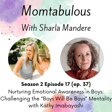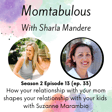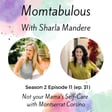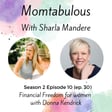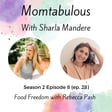Become a Creator today!Start creating today - Share your story with the world!
Start for free
00:00:00
00:00:01

To the edge - of Motherhood
How do you teach a child to set boundaries? Do they know what the word even means?
In this short and to-the-point episode, I explore how to help your kids set boundaries to help them navigate toxic situations in life as they grow and learn about relationships. Sharing some of my own personal story growing up, as well as in motherhood, I share the ways I have taught my kids to be strong and convicted in their boundaries, and the number one way I believe we can teach our kids to find where that line is for them, and how to voice it in a powerful and confident way.
Interested in starting your own podcast? Use my special link: sharlam to save 30% off your first month of any Zencastr paid plan!
Transcript
Teaching Kids Boundaries
00:00:13
Speaker
Hello and welcome back. Today we are talking about ways to teach your kids boundaries, specifically like teenagers. But I believe this starts when they're little, you know, when my kids were very little, I had a lot of the fears that moms have of something bad happening to them and them not having a voice to be able to say no or come and tell me. So I kind of set this like,
00:00:39
Speaker
There's no secrets from mommy thing, which really was funny at times. I think I mentioned on another show how my oldest would literally tell me everything of like, you know, Grammy gave us candy and told us not to tell you.
00:00:54
Speaker
Papa took us to McDonald's, which like I didn't, these are just, you know, I gave him candy every once in a while, but it was the gram he told us not to tell you when she'd tell me anyway. Or Papa took us to McDonald's, which he wasn't saying, don't tell your mom, but I just didn't take them there. And so they felt like, I gotta tell, you know, mom. But what I've seen throughout the years of my kids in school is standing up and speaking up
00:01:27
Speaker
This is something that I feel like I've done pretty good at. Now I grew up in a household where I had never heard the word boundaries until I moved out and went to college and started doing a lot of the work on myself.
Learning Boundaries in Adulthood
00:01:40
Speaker
And somebody mentioned the word boundaries in like a group kind of coaching session at one point. And I had to go home and look it up. I didn't know what that was and what that meant. And.
00:01:46
Speaker
in ways that made me really proud and far from a perfect parent.
00:01:53
Speaker
And I loved my mom very much, but I was raised by a narcissist. So there were no boundaries in my house. There was no saying no to her. There was no ability of like, well, what is it that I want to do? What interests me? Where does my ability to say, no, I don't want to do that right now. That doesn't feel good. Not just like I'm not doing the dishes or my chores, right? But just like, I don't want to dance in this group anymore. I don't want to necessarily.
00:02:22
Speaker
have a dance solo or be the star of, of this show. Why do you always have to push that on me? Right. And so being able to set boundaries, but even with you and kids will test and teenagers will test. So my kids have tested setting boundaries with me. And the one thing that I have to do is take a step back and out of my ego as a mom and really listen. And the more that you listen, when they're trying to set the boundaries with you,
00:02:52
Speaker
I think it teaches them to set the boundaries with other people. And, you know, you could look up online ways to teach your teens healthy boundaries.
Using Board Games to Teach Boundaries
00:03:02
Speaker
And one of the ways is that is suggested is like board games or yard games.
00:03:07
Speaker
And I love that because there are clear rules to follow, right? If you're playing, you know, a monopoly or candy land, we love the old school games here. And it teaches them like, yeah, there's this rule and there's that rule. And we're choosing to follow these rules because these are the boundaries set around the game, but it also keeps everything very fair, right? And there's no arguing about
00:03:30
Speaker
Well, they did this and they did that and you're making up your own rules and all of that. But we have a lot of fun with those games too. So I don't even necessarily tell them that we're practicing as boundaries in those moments. They just do that. They have fun with things like UNO of like reverse and draw four, right? But it gives them a power and a choice in order to do that.
00:03:52
Speaker
And I think one of the best ways to also, you know, teach them those boundaries is to practice at home, right? Of like setting them for yourself with the kids. And that comes with, I call them expectations in our house. My expectation is, right, that your homework is done before you get on your phone. My expectation is that this weekend, before you hang out with your friends, A, B and C is done. And whether they know that's a boundary or not,
00:04:18
Speaker
they're learning that something needs to happen in order for them to get something
Encouraging Open Communication
00:04:23
Speaker
else. Another way that I've taught my kids boundaries is by keeping really open communication between us. And I kind of touched on that a little bit of like, there are no secrets from mommy, right? But I'm constantly in my teenager's face of like, what? Who said what? Tell me. Because what happens is as they feel more comfortable to come to you with the little things, kind of like what Amy, if you didn't listen to the bullying episode,
00:04:48
Speaker
Go back and listen to that because Amy was talking about if we want our kids to be able to talk to us about the big stuff, they have to feel comfortable to come to us with the little stuff. And so I watched the TikTok videos that she wants me to watch, even though I watched it 13 times. Just like when they're toddlers, you watch Finding Nemo 27 times in a week.
00:05:07
Speaker
They want to watch it. It doesn't end toddlerhood. Teens now just have shorter attention spans. Thank you, TikTok, right? But to show those videos over and over again, yeah, I'll watch them. I'll watch all the cheer dance videos in the Minnesota and Ohio teams. That's all big right now as I'm filming this, you know, over and over and over again, because then she starts talking to me about other things. And the more that we can talk about the things with the friends,
00:05:32
Speaker
I can say things like, man, you know, how did you feel? What did you say? Oh my gosh, what did she do? What did he do? What did they say? How did they respond? How did that make you feel? Just asking those questions so that she answers them. And then sometimes I'll get a, what do you think?
00:05:51
Speaker
What do you think, mom? And it's like, well, you know, when I was in high school, this is for sure how I would have felt. This is what I would have done. But you know what? This is what I would do now, right? Yeah, in high school, I would have made the mistake of doing blah, blah, blah. But now as an adult, having learned those lessons, what I know is probably a better choice is to do blah, blah, blah, blah.
Navigating Teenage Drama
00:06:15
Speaker
And we can have those conversations. Now, whether she chooses to make those choices or not is different, but at least it's in her head so that when there is a next time, because there will always be girl drama, boy drama, especially in high school, middle school and high school. And the thing that I've noticed too is that I have two girls, so the girl drama.
00:06:38
Speaker
man, that started way earlier than it did when I feel like when I was in school, when I was in school, it was just like, she played with her and not me kind of thing. But now, I mean, my God, the stuff she came home talking about in first grade, I was like, that's middle school stuff. But then by the time I got to middle school, it's like, that's high school stuff. And now in high school, I'm like, this is straight up kids are acting like adults, right? And so being able to have those open conversations helps them
00:07:07
Speaker
to talk through those boundaries and find those boundaries. They kind of have to like trial by fire, experience those things. And I'm glad they do. And the thing that I want is for them to continue to come and talk to me about it because then they're not alone and they're not making necessarily the really bad choices, right? They may not be perfect, but they're not making the really bad choices.
00:07:29
Speaker
But here's the thing that I have found to be the number one way that I've taught my kids to hold strong boundaries.
Parents Demonstrating Boundaries
00:07:38
Speaker
And it may sound really simple. Maybe it'll surprise you, but it may sound really simple. And that is simply by practicing them myself. Again, like I said, that word was never thrown around when I was a kid. I don't feel that it was ever really modeled when I was a kid. And you know, my parents fought a lot and had a lot of
00:07:56
Speaker
fights and they weren't good and they didn't fight in a healthy way. And so when my husband and I argue, you know, we will debate things in front of the kids. We will disagree in front of the kids.
00:08:08
Speaker
We never full on fight, but I think it's important for them to see fighting fairly, disagreeing respectfully and fairly because that's how they learn what they're going to do in relationships in the future. So, you know, when we do disagree or we do bicker, I think is the right word I was looking for in front of our kids, we make sure, you know, we're not name calling, we're not swearing, we're not
00:08:31
Speaker
Throwing things we're not getting violent where we're just having an argument and it's not a big one And I know some people are like we never argue in front of our children But let me tell you I believe and this is my personal belief that that does more detriment to them than seeing people who can argue and disagree fairly and then also forgive and make up because you're gonna learn the boundaries right of like, okay, there was this argument and They both said they were sorry
00:09:01
Speaker
and they hugged it out and it was all okay. Versus if something really big were to go down, you know, my husband has never, ever hit me and I don't believe he ever would, but if he did, we would be gone. And they would see that boundary set, boom, right? You know, and so I do think that it's important for them to see little bits of that because it builds that resiliency of, okay, we can disagree.
00:09:24
Speaker
And we can talk it out and we can, we can learn how to talk things out fairly and even agree to disagree sometimes. I think that that's important. Of course, you don't want to argue and fight constantly. You don't want to throw things and scream and yell and totally lose it because that's not healthy. But having the kids witness what I call a fair argument. And see, again, I didn't have that growing up. I don't think that my parents fought fairly and
00:09:54
Speaker
It got really bad to the point that for years they would threaten divorce until like, gosh, 10, 12 years later, they finally did end up in divorce. And at that point it was just really bad. And I was in college at that point, but you know, for my husband and I to argue and not threaten that. I feel as a win above where my parents were and my kids aren't seeing that over and over and over again and feeling that stress.
Boundaries in Friendships and Work
00:10:18
Speaker
So I believe that we can teach them boundaries
00:10:22
Speaker
by setting them ourselves. I've had friends that I've set strong boundaries with of, you know what, this friendship doesn't feel good to me anymore. My kids will ask, well, how come you're not talking to so-and-so as much anymore? And I'll just have to say, you know, it was a friendship that didn't feel good to me anymore. I felt that I was, it was more one-sided or I felt that I was being taken advantage of or I felt like I wasn't being heard as much or I didn't feel supported. I felt judged.
00:10:49
Speaker
That's a boundary. And to be able to be honest with them in, again, on their level, right? They're 11 and 14 right now. So we can talk a little bit more, quote unquote, big kid, you know, than when they were like five. But, you know, to be able to say it was a friendship that wasn't serving me. It was a friendship that didn't feel good. Or I've left jobs. I left a, I left a job very recently that
00:11:16
Speaker
was just didn't feel good to me anymore. And the boss that I had was not treating me respectfully. And I, you know, my kids have said, well, why, why, why did you leave? And I got the opportunity to say, you know, it wasn't a job where I was feeling happy, where I was feeling fulfilled, where I was feeling supported and where I was feeling like safe emotionally to even walk into work. It kind of became toxic. And
00:11:46
Speaker
I won't do that anymore. Charlotte in my 20s stayed at many toxic jobs, which I'd go home and I'd cry and I was in graduate school with an eating disorder and I finally left and that was the best thing that I could have done for myself.
00:12:02
Speaker
But that was a point in my life where I was learning those boundaries. I was learning it's okay to walk away. Even if other people will see it as you quit, you quit grad school. When someone says that to me, my response is always actually what I did is I chose myself. I chose my sanity and I chose my health. I prioritized me and I didn't need an MFA.
00:12:29
Speaker
to come home and do the things that I wanted to do. And so I left graduate school and I talk about that with my kids. I will tell them like, you know, I have a high schooler, I have a middle schooler who I'm homeschooling right now and my middle schooler that we are homeschooling put her foot down last year. She was at a middle school that was a fourth through eighth grade and it was not a place that felt safe or healthy to her anymore. The anxiety was taking her down. And I won't talk a lot about that because it's her story
00:12:58
Speaker
But at one point, she finally put her foot down and looked at me and said, I'm never going back there
Respecting Children's Boundaries
00:13:05
Speaker
again. And I heard it in her voice. She was convicted in it. She was strong. And I went, OK. And that's how you teach your kids the boundaries, because this year we're rebuilding. We're homeschooling. We're rebuilding. Her confidence is coming back. She's feeling safe to go places and do things. And that is important to me as a mom.
00:13:26
Speaker
I watched her set a very strong boundary. A lot of people would have said, you're 11, suck it up. You've got to figure out how to go to school. And you know, we have the ability to homeschool here. And is it something I wanted to do? Not necessarily. Is it something I'm doing? Yeah. Are we figuring out what's working? Yes. Is our goal to get her back into a classroom? Yes. It will not be at the same school. I will not make her go back there. And that teaches her that boundary.
00:13:54
Speaker
I think learning that at 11, there's gotta be a reason for it. For her, when she gets into college or jobs as she gets older to learn, oh yeah, this is like when that did not feel good, this doesn't feel good, I gotta get out of here. And, you know, with jobs, of course you wanna find something else if you need to, right? But just being able to set that boundary to say, this is a situation, whether it's a relationship, whether it's a friendship, whether it's a job,
00:14:24
Speaker
whether it's a living situation with a roommate, whatever it is in the future for them to be able to say, this does not feel good. This is not serving me. This is not right for me right now. Maybe it was at one point and now it's not anymore. But you can teach them to say, this is not serving me. And peace out.
00:14:47
Speaker
Right? Or to say, this is not serving me if it's a friend or a boyfriend or a girlfriend or whatever. This is not serving me. Let's talk through this and see. And maybe they can resolve things, hug it out and move on. But at least that boundary is set so that that thing doesn't happen again in the future.
00:15:07
Speaker
Please don't talk to that person in that way about me. Please don't say that about me. Please don't talk to me about this person because that person is my friend, so please don't talk bad about them around me. Whatever that boundary is, they learn how to set it by the example that we've set.
00:15:24
Speaker
So I hope that helps you to look and think about how you can also parent in a mom tabulous way in terms of teaching the kids boundaries, because I think it's important to learn at a very young age, even at five years old of this is a friend and she took my toy and I didn't like that. Well, how do you advocate for yourself? How do you set the tone?
00:15:48
Speaker
I told my kids many times you teach people how to treat you and so this is a way that we can teach them how other people can treat them and they get to learn that by the example that we set.
00:16:03
Speaker
I hope that this has helped you and just jogged the pieces of your memory and your mind to say, okay, this is something else that I can do more of, or I can try this way or that way. There's many, many different ways that we can teach our kids boundaries. There's also healthy boundaries and unhealthy boundaries.
00:16:23
Speaker
So, you know, that's a whole other thing. And some places we'll talk about role playing. And, you know, I highly doubt that there's a teenager on the planet that would be like, sure, let's role play. That sounds like fun. You know, I don't know that there, you know, the way I do that, it's kind of acting exercises of like, let's say I'm this person. If I said this, what would you say? Without telling them we're role playing, right?
Conclusion on Teaching Boundaries
00:16:45
Speaker
So again, thank you so much for listening. I hope this has been helpful. I would love to hear if you've tried any of these and other ways that you teach boundaries with your kids. And I look forward to have another chat on the next episode. I've got a special guest and you're going to love it. It's going to be amazing. I will see you next time.

